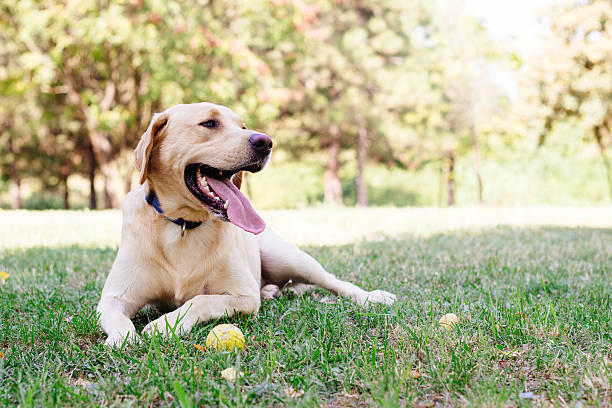Assume you’re frightened of rats and there’s one crawling on the floor a few feet away. You’d want to keep a close watch on that rat to ensure it doesn’t come too near, wouldn’t you? You may be anxious and apprehensive. The mouse draws nearer to you. The nearer it comes, the more nervous you become. And when you get close enough, you respond! You may scream, leap up, and stamp on the rat. That action may be interpreted as anger against the rat, yet the feeling underlying it is fear. Learn more about the Reasons Why Your Labrador Barking at your guest and how to stop them.

Similarly, a reactive dog, such as a labrador who barks at visitors inside or outdoors, is uneasy. He may be afraid of strangers, defensive of his house, or suffer from overall anxiety that manifests as a response when anything unusual occurs.
Understanding the underlying feeling can help us influence the resulting behavior (barking)! So this article is all about why your labrador barks at your guests, what are the causes, and how to prevent this from happening.
Without further ado, let’s get started.
Barking Dogs: What Makes Them Do It?
Domestication of dogs happened between 20,000 and 40,000 years ago, according to new findings. Dogs have learned to understand large vocabularies, complicated sentences, and even up to 1,000 words if properly schooled in that time.
Dogs and humans communicate using both vocal and nonverbal cues. Barking is a natural behavior for dogs, and it is one of the most effective methods for them to communicate with their owners.
They use barking to communicate a variety of emotions, therefore pet parents must contextualize a dog’s vocal signals within their visual signs to fully comprehend what a dog is communicating (dog body language).
Common Reasons For Why Labradors Bark At Guests
Here’s a list of the most common reasons dogs bark to help you figure out what they’re attempting to communicate.
Dogs Become Excited To See Your Guests
Is your dog starting to bark when you bring visitors home, or when they hear the familiar sound of you grabbing their leash? Those are some ecstatic barks. Being part of your family, labradors react when they see your guests.
In fact, yipping and meowing are one of the ways that dog packs communicate with one another. The barks are high-pitched or medium-pitched, and your dog will let out one or two at a time until the excitement wears off.
The barks are typically accompanied by a wagging tail and an alert—but happy—body position (ears perked and head held higher).
Labrador Consider Your Guests Scary
Repeated exposure is the technique of gradually exposing your labrador to a trigger in order to modify his reaction to it. This, paired with implications for the ways, can teach your dog that visitors are wonderful!
What is the most upsetting aspect of having a visitor in your home? Is it a knock or a doorbell? You’re the one who opens the door and greets the visitor? Or the actual individual that walks into the room?
Decompose each of the components required and concentrate on them individually. The most typical issue here is that individuals try to go too quickly or add too many stages at once.
General Causes
It’s crucial to figure out what’s causing the barking behavior before you can stop it.
- When dogs scream angrily at people, other dogs, or other animals who are within or approaching their territory, this is known as territorial barking. Your dog’s territory encompasses the area surrounding your home as well as everywhere else where your dog has spent time or has a strong relationship with you, such as your automobile and places you walk together.
- Alarm barking is when a dog reacts to any noise or sight, regardless of the situation. When these dogs bark, their bodies are usually stiff, and each bark causes them to move or jump forward 1 or 2 inches. These dogs are capable of barking at any sight or sound, not only when protecting recognized areas.
- Attention-seeking barking is when a dog barks for attention or rewards, such as food, toys, or play.
- When they come into contact with humans or other dogs, Labradors yell, yet they are happy canines with flexible bodies and swinging tails who may even whimper.
- Excessive barking dogs bark forcefully and repeatedly. These dogs also have a habit of repeating their movements. Indoors, an obsessive barker, for example, would pace or gallop back and forth along a fence.
- When dogs with socially supported barking hear other dogs barking, they bark excessively.
- Dogs are in a stressful position, such as when their activity or movement is restricted, frustration-induced labrador barking occurs.
How To Prevent Your Labrador From Barking At Your Guests?
Try softly knocking on a table or the ground and rewarding your dog with a treat if your dog barks when someone knocks on the door. Increase the intensity of the strikes, then have someone knock on external sources (but not enter).
Rehearse raising and closing the door if he barks every time you open it (and even greeting an imaginary person). Give him a reward every time the door opens.
Enlist the help of a kind friend or neighbor to stand outside your door while you praise your dog for keeping calm when a human is around. Gradually get to the point when the person takes a step inside and immediately exits.
When welcoming visitors outside, some labradors appear to be less anxious. Consider taking your dog for a stroll around the block with a visitor before stepping inside.
If your dog continues to startle and bark at visitors once they’ve entered your home, ask them to remain seated and avoid eye contact. Allow them to toss goodies from time to time, but do not allow them to feed your dogs by hand. If your guests need to get up and move about, direct your dog away with yummy goodies to give them some breathing room, then feed them while your guests walk around.
Don’t be afraid to confine your dog to a baby fence, training pen, or even another area with a soft toy. This break is frequently required!
Every dog has a response threshold beyond which it will start to react. Determine your dog’s tolerance level (keep a watch out for the anticipatory behaviors indicated above!). Start by exposing him to stuff that does not make him bark. As your dog learns that strangers aren’t scary, gradually raise the challenge.
Some Practices To Stop Your Dog From Barking Labrador At Guests
- As soon as your dog senses a person, say “yes!” or activate your buzzer and give your dog a treat.
- You may use the goodie to pull your dog away from the trigger at the same time if necessary.
- When he’s finished eating the treat, he’ll probably look for the person again.
- Mark the guy every time he stares at him (with a “yes” or a click).
- To avoid a reactive outburst, bring him inside after a few repetitions.
- Consider waiting a few seconds after your dog recognizes the person before rewarding him after he has mastered the game. Your dog should turn away from the person and look at you since he is expecting a treat.
All these remedies will help you in preventing your labrador from barking at guests. However, if your labrador faces some kind of medical condition or mental illness, you should go to the vet.
Wrapping Up
A labrador may bark in front of your guests for several reasons, including protecting his territory, indicating a stranger, garnering attention, saying hello, expressing discomfort or dissatisfaction, and more. It’s crucial to understand why a labrador barks so that you can teach him to stop. In some cases, such as in the case of excessive labrador barking, a veterinarian may recommend medications. However, there is no quick fix, and the only options are training, behavioral treatments, and environmental changes.







